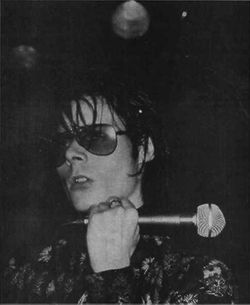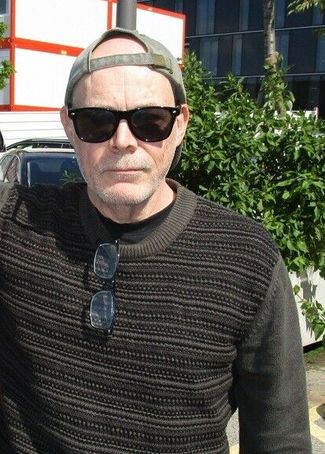Andrew Eldritch
Andrew Eldritch (born Andrew William Harvey Taylor, May 15, 1959) is the frontman, singer, songwriter and the only remaining original member of The Sisters Of Mercy. He programmed The Sisters of Mercy's drum-machine tracks and played guitars and keyboards in some of the band's studio recordings. He and Gary Marx also founded the record label Merciful Release. In 1986, Andrew Eldritch established the side-project The Sisterhood in addition to The Sisters of Mercy, which was shortly abandoned in favour of continuing working under The Sisters of Mercy banner.
Early Life (1959-1977)
Andrew Eldritch was born in the small city of Ely in Cambridgeshire, East Anglia in 1959, the same year as fellow post punk icons Robert Smith of The Cure and Morrissey (originally of The Smiths). The song 1959 alludes to the year of his birth, starting with the line Living as an angel in the place that I was born.
Little is known of Eldritch's family or upbringing; he seems reluctant to discuss these matters in interviews.
As far as we know, his father was a member of the British Air Force, so the family had to move several times abroad.
University Education (1977-1980)
Eldritch studied French and German literature at St John's College, Oxford before moving to Leeds around 1978 to study Mandarin Chinese at Leeds University; he quit both courses before getting a degree (he speaks fluent English, French and German, and has some knowledge of Dutch, Italian, Russian, Serbo-Croatian and Latin; he claims he forgot the Mandarin Chinese he learned [1]). During this period, Eldritch was a freelance drummer in the local Leeds punk scene (in his own opinion, a bad one).
The Sisters of Mercy
1980 - 1985
Around 1980, Andrew Eldritch and Gary Marx formed The Sisters of Mercy. On the first single, "Damage Done/Watch/Home of the Hit-men" (1980), Eldritch played the drums, a task he got soon relieved of by the drum machine Doktor Avalanche, allowing him instead to focus on his vocal performance. Right from the beginning, The Sisters of Mercy founded their own label Merciful Release. 1981 saw their first live performance at Alcuin College (University of York), England and a few more gigs in Yorkshire, while the next year already had them touring further around the UK.
...
| This page is Work in Progress and going to be extended as soon as ever possible |
1986 - 1988
....
In these early the years, various short-time members left the group, some of them citing conflicts with the frontman as a reason for their departure. .
The 1990s ...
Following the release of Vision Thing, the band's last studio album to date, and following the according tours, Andrew Eldritch initiated a 1991 U.S. tour of The Sisters of Mercy in a double-bill with hip-hop act Public Enemy in an attempt for cross-cultural understanding. Due to the general situation on the US-festival market a large part of this tour was cancelled by the promoters and The Sisters of Mercy concentrated on their European audiences and would not return to the US before 1998.
Anyway, conflicts with the record company EastWest had effectively set the band on "strike", an absolute refusal to record any new material until 1997, when Andrew Eldritch produced the SSV album "Go Figure", featuring his vocals over drumless electronic music. The album finally freed him from his contractual obligations, as EastWest agreed to waive their claims for two more Sisters of Mercy albums in exchange for the recordings. The SSV tracks were however never officially released. The full name of the band is SSV-NSMABAAOTWMODAACOTIATW, said to be an acronym for "Screw Shareholder Value - Not So Much A Band As Another Opportunity To Waste Money On Drugs And Ammunition Courtesy Of The Idiots At Time Warner".
Andrew Eldritch's work during the 1990s also included vocal contributions studio recordings by Gary Moore and Sarah Brightman. In 1995 he interviewed David Bowie for the German edition of Rolling Stone magazine. Prevented by contractual obligations to appear under his own name, he is also rumored to have produced a couple of techno albums under various pseudonyms during the 1990s, a rumor he would not deny when asked about it.
... and forward
The Sisters of Mercy tour every year, but no new recorded material has been released for sale since 1993. Despite this, the band continue to debut new material on stage on a regular basis, infrequently playing secret gigs under a pseudonym in their various spiritual home towns.
In 2009, Andrew Eldritch gave his first interview in 12 years to Classic Rock magazine, in which he talked at length about the band's career and denied the need for any new recorded material from The Sisters. And he would keep to this attitude for a long time.
Nonetheless, the year 2019 saw some new songs from The Sisters of Mercy. Not all of which got performed, not to mention released, so far before the worldwide coronavirus surge stopped all public concerts and further developments for a while. However, check here (for example) for the new tracks presented in 2019 and along these pages for the 2020 events. As the 40th Stage Anniversary celebrations of 2021 were limited to three UK-gigs at the London Roundhouse, no new songs were performed during that year. But all that would change with 2022...
Songwriting and philosophy
In his lyrics Andrew Eldritch frequently uses literary and political allusions. The themes of his songs span from erotic imagery and experiences of drug use to an acrimonious criticism of the politics of the United States, a country which Eldritch claims to have a "hate-hate" relationship with. Politically, he has claimed to be "traditionally a Labour supporter despite my anarcho-syndicalist tendencies".
Gothic associations
Though Andrew Eldritch is often called the "Godfather of Goth" [2], The Sisters of Mercy (the main artistic vehicle of Andrew Eldritch), despite being formed in 1980, were originally not very popular in the post punk sub-genre that the British press of the early 1980s had labelled, both the artists and their audience, as "Goth". The Sisters of Mercy were, however, accused by the press of plagiarizing Joy Division, who were marketed by their management as "gothic" as early as 1979. [3].
The Sisters of Mercy would have a big impact on the second wave of Goth that came in the late 1980s and early 1990s, one of the reasons Gitane Demone of the first wave commented that the scene had turned "stale". The use of drum machines and the atonal, deep vocal style used by many second generation Goth bands were inspired by the Sisters of Mercy and were not that common among the first generation.
Since the early 90s, Eldritch has publicly rejected associations with the Goth subculture. He describes The Sisters of Mercy as humanist, modernist, and implies he wants nothing to do with Goth, stating "it's disappointing that so many people have in all seriousness adopted just one of our many one-week-of-stupid-clothes benders". He also notices that "I'm constantly confronted by representatives of popular culture who are far more g*** than we, yet I have only to wear black socks to be stigmatised as the demon overlord" [4].
Guest appearances
- Gary Moore - After the War (1989) - Backing vocals on "After the War", "Speak for Yourself" and "Blood of Emeralds"
- Kastrierte Philosophen - "Toilet Queen" (1989) - Remix of Toilet Queen - see the video on YouTube ...
- Die Krupps - III: Odyssey of the Mind (1995) - Remix of "Odyssey of the Mind"
- Krupps - Rings of Steel (1995) - Remix of "Fatherland" (with Rodney Orpheus from The Cassandra Complex)
- Sarah Brightman - Fly (1995) - German interlude on How Can Heaven Love Me and backing vocals on A Question of Honour
- Tarwater . Rabbit Moon - Revisited (1998) - Lyrics and vocals on Mobile Home,
- which are a remixed sample from the Mother Russia part of Dominion/Mother Russia.
Further Information
See under Band History
This article was mostly adapted from the wikipedia entry for Andrew Eldritch
Most recent interviews:
- Interview by Mark Andrews on Louder, May 11th, 2023
- Interview by the creative independent, September 25zh, 2023

